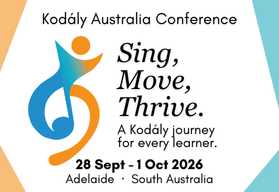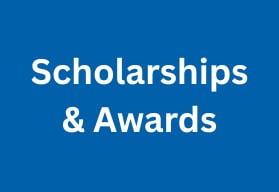Kodály in Australia
by Deanna Hoermann
There is a moment that is right for any major change and in relation to the introduction of the Kodály movement in Australia this was certainly the case.
At the beginning of the 1960s in NSW the introduction of the Wyndham Scheme was a significant change that altered the landscape of secondary education. Music was a compulsory core subject for all secondary students. Those students who wished to pursue their study of music in greater depth from Year 8 were able to choose music as an elective subject. As implementation of the music syllabus progressed, two important educational issues emerged.
The first revolved around the introduction of music to adolescents, many of whom were negatively disposed towards the experience. The second issue revolved around the appropriateness of the syllabus content particularly in terms of aural skill development. Of course those students who had received private music tuition during their early years were often advantaged.
While many teachers had developed strategies for their own classroom, support materials which outlined coherent approaches, such as the development of the musical ear, did not accompany the syllabus. This stimulated a number of music teachers to seek answers further a field. I went to Hungary.
This unique experience almost twenty eight years ago, was powerful. It was the first time that I became aware of the developmental and sequential nature of learning. The possibility of developing a musical ear through early intervention and careful sequencing was fascinating.
I often reflect upon my good fortune that this experience occurred at a time of amazing educational opportunity in Australia. During the early 1970’s, a change in Government at the Federal level led to an unprecedented flow of economic resources into the education systems in all States. The seeds of the Kodály movement in Australia were sown during a period that encouraged and nurtured the exploration of educational ideas. The fundamental question of how children learn entertained researchers and educational thinkers.
The Kodály method, as it was frequently called, was an educational innovation which faced significant challenges. During its initiation phase there were many who warned of the dangers of transplanting a system, so strongly based in a particular cultural heritage, to another quite alien situation. The first very hesitant steps, which constituted experimentation at the Kindergarten level, culminated in the decision by the Regional Director that the Kodály innovation should be implemented in the metropolitan western region of Sydney.
The idea that musical literacy, as an outcome of sequenced teaching strategies, could be realised in the general classroom was compelling. The challenge of using musically untrained teachers to implement the innovation had many positive features but generated the further challenge of combining intensive teacher training in the work place while implementation progressed.
The great opportunity to break with the existing patterns of classroom practice and to introduce new insights into the young child’s learning process through music was an extraordinary opportunity for all involved. The legitimisation of the pilot program ensured that musical practice was made explicit through consultancy-based support for teachers in the classroom. The powerful philosophical principles of Kodàly which underpinned the innovation, provided a remarkable framework for the implementation process over a fourteen year period from Kindergarten to Year Six and on into secondary school.
While the system requirements surrounding the project were challenging, in reality they actually led to a demonstration of the potential of a supportive and collaborative approach to deliver music education to all students, to create a climate in which collective learning could flourish and amazing achievements could be celebrated. While the professional development was appropriate to the particular requirements the courses, the action research, the peer coaching and mentoring, demonstration teaching and the design of the curriculum as the project progressed were powerful strategies.
Through the acquisition of music skills, general classroom teachers revisited the learning process from the point of view of the child and were able to experience music as a powerful learning tool. The approach generated great enthusiasm for the connection between the musical learning process and the acquisition of literacy and numeracy skills. Did one affect the other? The research certainly showed that there were gains for the child who was exposed to this musical opportunity.
The extraordinary commitment of so many of the Principals of Infants and Primary schools was a significant factor in the success of the program. The project highlighted the importance of the leadership role of the Principal particularly the ways in which they encouraged and worked with their staffs to build the new musical strands into the existing operation of the school.
System financial support for the innovation allowed a team of 3 to 5 consultants to focus on producing the materials and teaching strategies that would encourage more effective musical outcomes for all students. This team had the privilege of regular reflection. The opportunity for regular feedback lead to modifications and improved practice.
The project impacted upon the music curriculum of every State in Australia. It stimulated teachers to rethink the role of music in the general education of children. It provided those who participated with musical understandings far beyond those normally accepted as possible with the young child. It reignited the debate about specialist music teachers in the primary school and how they might best be used.
The process of implementation highlighted the need for more organised support for the dissemination of the musical ideas. National Conferences with the input of many outstanding exponents from Hungary, England, America, Canada, Finland, Japan and Belgium, as well as overseas study tours, stimulated requests for branches of the Association to be established in other States and these requests ultimately led to the establishment of the Kodaly Music Education Institute of Australia in 1976.
By 1981 conditions in the external environment were changing. The application of financial resources to educational projects was now under greater scrutiny and subject to much tighter controls. A Review of the project in 1981, under the auspices of the then Minister for Education, recommended a model of music education for the State based on the Developmental Music Project which would have spread the program throughout New South Wales and introduced specialist music teachers into the primary school. The Minister proposed to the Department of Education that the financial support required implementing this project be found from within the Department’s existing budget by reducing the number of Inspectors of Schools. While the Senior Executive of the Department fiercely opposed this, the untimely death of the Minister put the proposal to rest.
Thankfully more focused efforts were carried out in other States, but the shining light would have to be the work undertaken in the Queensland Department of Education. Under the leadership of Ann Carroll, the Kodály work was once again initiated and has continued. It stands as testimony to the benefit of well and carefully planned strategies underpinning the process of change with sufficient resources to support the process of implementation. The emergence of post-graduate courses has taken the work a further step forward in both Queensland and New South Wales.
It is to be hoped that the next twenty five years will give rise to new thinking in the area of music education, will capture the best of the technological advances, tap into the musical intelligence to improve the learning of students in other learning areas and build on the best experiences of the past so that the world of music is accessible by all.
Source: Hoermann, D. B. (1985). In L. Vikár (Ed.), Reflections on Kodály (pp. 104-109). Budapest, Hungary: Editio Musica Budapest.
Top
The Kodály Concept
Latest News
Happy New Year!
As we near the end of 2025, I extend my warmest wishes on behalf of Kodály Australia for a positive and fulfilling year ahead. Supporting our community is at the heart of our work, and this year our members have benefited from an extensive offering …
Read more
Congratulations Susie Fredline (Qld) & Dr James Cuskelly (Qld)
I write to acknowledge and celebrate two members of our community. Susie Fredline – Honorary Life Membership of Kodály Australia Congratulations to Susie Fredline (Qld), who was awarded Honorary Life Membership of Kodály Australia earlier this year. Honorary Life Membership is Kodály Australia’s highest accolade and …
Read more
NEW Member Resources
I am pleased to announce the launch of a refreshed Kodály Australia Member Portal. All members of Kodály Australia may now use the Member Portal to access an online repository of resources and professional learning. To access these resources, please explore the branch …
Read more
ASME XXV National Conference 2025
The Australian Society for Music Education (ASME) XXV National Conference will be held from September 26 to 29, 2025, at the Queensland Conservatorium, Griffith University. The call for paper and workshop presentations has been extended until this Friday, 14 February 2025. As …
Read more
Season’s Greetings from Kodály Australia
As we near the end of 2024, I extend my warmest wishes on behalf of Kodály Australia for a joyful festive season and new year ahead. This year, there has been an extensive offering of professional learning activities provided for …
Read more



